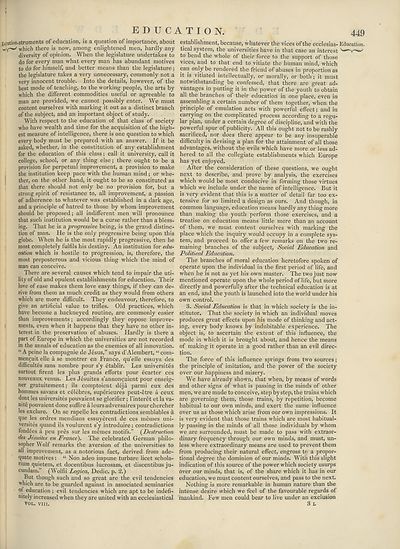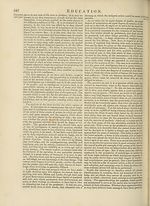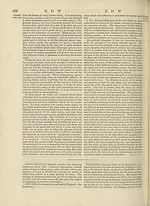Encyclopaedia Britannica > Volume 8, DIA-England
(459) Page 449
Download files
Complete book:
Individual page:
Thumbnail gallery: Grid view | List view

i
EDUCATION.
D :ation.struments of education, is a question of importance, about
which there is now, among enlightened men, hardly any
diversity of opinion. When the legislature undertakes to
do for every man what every man has abundant motives
to do for himself, and better means than the legislature;
the legislature takes a very unnecessary, commonly not a
very innocent trouble. Into the details, however, of the
best mode of teaching, to the working people, the arts by
which the different commodities useful or agreeable to
man are provided, we cannot possibly enter. We must
content ourselves with marking it out as a distinct branch
of the subject, and an important object of study.
With respect to the education of that class of society
who have wealth and time for the acquisition of the high¬
est measure of intelligence, there is one question to which
every body must be prepared with an answer. If it be
asked, whether, in the constitution of any establishment
for the education of this class; call it university, call it
college, school, or any thing else; there ought to be a
provision for perpetual improvement, a provision to make
the institution keep pace with the human mind; or whe¬
ther, on the other hand, it ought to be so constituted as
that there should not only be no provision for, but a
strong spirit of resistance to, all improvement, a passion
of adherence to whatever was established in a dark age,
and a principle of hatred to those by whom improvement
should be proposed; all indifferent men will pronounce
that such institution would be a curse rather than a bless¬
ing. That he is a progressive being, is the grand distinc¬
tion of man. He is the only progressive being upon this
globe. When he is the most rapidly progressive, then he
most completely fulfils his destiny. An institution for edu¬
cation which is hostile to progression, is, therefore, the
most preposterous and vicious thing which the mind of
man can conceive.
There are several causes which tend to impair the uti¬
lity of old and opulent establishments for education. Their
love of ease makes them love easy things, if they can de¬
rive from them as much credit as they would from others
which are more difficult. They endeavour, therefore, to
give an artificial value to trifles. Old practices, which
have become a hackneyed routine, are commonly easier
than improvements; accordingly they oppose improve¬
ments, even when it happens that they have no other in¬
terest in the preservation of abuses. Hardly is there a
part of Europe in which the universities are not recorded
in the annals of education as the enemies of all innovation.
“ A peine la compagnie de Jesus,” says d’Alembert, “ com-
men^ait elle a se montrer en France, qu’elle essuya des
difficultes sans nombre pour s’y etablir. Les universites
surtout firent les plus grands efforts pour ecarter ces
nouveaux venus. Les Jesuites s’annon^aient pour enseig-
ner gratuitement; ils comptoient deja parmi eux des
hommes savans et celebres, superieures peut-etre a ceux
dont les universites pouvaient se glorifier; 1’interet et la va-
nite pouvaient done suffire a leursadversaires pour chercher
les exclure. On se rapelle les contradictions semblables a
que les ordres mendians essuyerent de ces memes uni¬
versites quand ils voulurent s’y introduire; contradictions
fondees a peu pres sur les memes motifs.” {Destruction
des Jesuites en France). The celebrated German philo¬
sopher Wolf remarks the aversion of the universities to
all improvement, as a notorious fact, derived from ade¬
quate motives: “ Non adeo impune turbare licet schola-
num quietem, et docentibus lucrosam, et discentibus ju-
cundam.” (Wolfii Logica, Dedic. p. 2.)
But though such and so great are the evil tendencies
which are to be guarded against in associated seminaries
of education ; evil tendencies which are apt to be indefi¬
nitely increased when they are united with an ecclesiastical
VOL. VIII.
449
establishment, because, whatever the vices of the ecclesias- Education,
tical system, the universities have in that case an interest
to bend the whole of their force to the support of those
vices, and to that end to vitiate the human mind, which
can only be rendered the friend of abuses in proportion as
it is vitiated intellectually, or morally, or both; it must
notwithstanding be confessed, that there are great ad¬
vantages in putting it in the power of the youth to obtain
all the branches of their education in one place, even in
assembling a certain number of them together, when the
principle of emulation acts with powerful effect; and in
carrying on the complicated process according to a regu¬
lar plan, under a certain degree of discipline, and with the
powerful spur of publicity. All this ought not to be rashly
sacrificed, nor does there appear to be any insuperable
difficulty in devising a plan for the attainment of all those
advantages, without the evils which have more or less ad¬
hered to all the collegiate establishments which Europe
has yet enjoyed.
After the consideration of these questions, we ought
next to describe, and prove by analysis, the exercises
which would be most conducive in forming those virtues
which we include under the name of intelligence. But it
is very evident that this is a matter of detail far too ex¬
tensive for so limited a design as ours. And though, in
common language, education means hardly any thing more
than making the youth perform those exercises, and a
treatise on education means little more than an account
of them, we must content ourselves with marking the
place which the inquiry would occupy in a complete sys¬
tem, and proceed to offer a few remarks on the two re¬
maining branches of the subject, Social Education and
Political Education.
The branches of moral education heretofore spoken of
operate upon the individual in the first period of life, and
when he is not as yet his own master. The two just now
mentioned operate upon the whole period of life, but more
directly and powerfully after the technical education is at
an end, and the youth is launched into the world under his
own control.
3. Social Education is that in which society is the in-
stitutor. That the society in which an individual moves
produces great effects upon his mode of thinking and act¬
ing, every body knows by indubitable experience. The
object is, to ascertain the extent of this influence, the
mode in which it is brought about, and hence the means
of making it operate in a good rather than an evil direc¬
tion.
The force of this influence springs from two sources;
the principle of imitation, and the power of the society
over our happiness and misery.
We have already shown, that when, by means of words
and other signs of what is passing in the minds of other
men, we are made to conceive, step by step, the trains which
are governing them, those trains, by repetition, become
habitual to our own minds, and exert the same influence
over us as those which arise from our own impressions. It
is very evident that those trains which are most habitual¬
ly passing in the minds of all those individuals by whom
we are surrounded, must be made to pass with extraor¬
dinary frequency through our own minds, and must, un¬
less where extraordinary means are used to prevent them
from producing their natural effect, engross to a propor¬
tional degree the dominion of our minds. Witn this slight
indication of this source of the power which society usurps
over our minds, that is, of the share which it has in our
education, we must content ourselves, and pass to the next.
Nothing is more remarkable in human nature than the
intense desire which we feel of the favourable regards of
mankind. Few men could bear to live under an exclusion
3 L
EDUCATION.
D :ation.struments of education, is a question of importance, about
which there is now, among enlightened men, hardly any
diversity of opinion. When the legislature undertakes to
do for every man what every man has abundant motives
to do for himself, and better means than the legislature;
the legislature takes a very unnecessary, commonly not a
very innocent trouble. Into the details, however, of the
best mode of teaching, to the working people, the arts by
which the different commodities useful or agreeable to
man are provided, we cannot possibly enter. We must
content ourselves with marking it out as a distinct branch
of the subject, and an important object of study.
With respect to the education of that class of society
who have wealth and time for the acquisition of the high¬
est measure of intelligence, there is one question to which
every body must be prepared with an answer. If it be
asked, whether, in the constitution of any establishment
for the education of this class; call it university, call it
college, school, or any thing else; there ought to be a
provision for perpetual improvement, a provision to make
the institution keep pace with the human mind; or whe¬
ther, on the other hand, it ought to be so constituted as
that there should not only be no provision for, but a
strong spirit of resistance to, all improvement, a passion
of adherence to whatever was established in a dark age,
and a principle of hatred to those by whom improvement
should be proposed; all indifferent men will pronounce
that such institution would be a curse rather than a bless¬
ing. That he is a progressive being, is the grand distinc¬
tion of man. He is the only progressive being upon this
globe. When he is the most rapidly progressive, then he
most completely fulfils his destiny. An institution for edu¬
cation which is hostile to progression, is, therefore, the
most preposterous and vicious thing which the mind of
man can conceive.
There are several causes which tend to impair the uti¬
lity of old and opulent establishments for education. Their
love of ease makes them love easy things, if they can de¬
rive from them as much credit as they would from others
which are more difficult. They endeavour, therefore, to
give an artificial value to trifles. Old practices, which
have become a hackneyed routine, are commonly easier
than improvements; accordingly they oppose improve¬
ments, even when it happens that they have no other in¬
terest in the preservation of abuses. Hardly is there a
part of Europe in which the universities are not recorded
in the annals of education as the enemies of all innovation.
“ A peine la compagnie de Jesus,” says d’Alembert, “ com-
men^ait elle a se montrer en France, qu’elle essuya des
difficultes sans nombre pour s’y etablir. Les universites
surtout firent les plus grands efforts pour ecarter ces
nouveaux venus. Les Jesuites s’annon^aient pour enseig-
ner gratuitement; ils comptoient deja parmi eux des
hommes savans et celebres, superieures peut-etre a ceux
dont les universites pouvaient se glorifier; 1’interet et la va-
nite pouvaient done suffire a leursadversaires pour chercher
les exclure. On se rapelle les contradictions semblables a
que les ordres mendians essuyerent de ces memes uni¬
versites quand ils voulurent s’y introduire; contradictions
fondees a peu pres sur les memes motifs.” {Destruction
des Jesuites en France). The celebrated German philo¬
sopher Wolf remarks the aversion of the universities to
all improvement, as a notorious fact, derived from ade¬
quate motives: “ Non adeo impune turbare licet schola-
num quietem, et docentibus lucrosam, et discentibus ju-
cundam.” (Wolfii Logica, Dedic. p. 2.)
But though such and so great are the evil tendencies
which are to be guarded against in associated seminaries
of education ; evil tendencies which are apt to be indefi¬
nitely increased when they are united with an ecclesiastical
VOL. VIII.
449
establishment, because, whatever the vices of the ecclesias- Education,
tical system, the universities have in that case an interest
to bend the whole of their force to the support of those
vices, and to that end to vitiate the human mind, which
can only be rendered the friend of abuses in proportion as
it is vitiated intellectually, or morally, or both; it must
notwithstanding be confessed, that there are great ad¬
vantages in putting it in the power of the youth to obtain
all the branches of their education in one place, even in
assembling a certain number of them together, when the
principle of emulation acts with powerful effect; and in
carrying on the complicated process according to a regu¬
lar plan, under a certain degree of discipline, and with the
powerful spur of publicity. All this ought not to be rashly
sacrificed, nor does there appear to be any insuperable
difficulty in devising a plan for the attainment of all those
advantages, without the evils which have more or less ad¬
hered to all the collegiate establishments which Europe
has yet enjoyed.
After the consideration of these questions, we ought
next to describe, and prove by analysis, the exercises
which would be most conducive in forming those virtues
which we include under the name of intelligence. But it
is very evident that this is a matter of detail far too ex¬
tensive for so limited a design as ours. And though, in
common language, education means hardly any thing more
than making the youth perform those exercises, and a
treatise on education means little more than an account
of them, we must content ourselves with marking the
place which the inquiry would occupy in a complete sys¬
tem, and proceed to offer a few remarks on the two re¬
maining branches of the subject, Social Education and
Political Education.
The branches of moral education heretofore spoken of
operate upon the individual in the first period of life, and
when he is not as yet his own master. The two just now
mentioned operate upon the whole period of life, but more
directly and powerfully after the technical education is at
an end, and the youth is launched into the world under his
own control.
3. Social Education is that in which society is the in-
stitutor. That the society in which an individual moves
produces great effects upon his mode of thinking and act¬
ing, every body knows by indubitable experience. The
object is, to ascertain the extent of this influence, the
mode in which it is brought about, and hence the means
of making it operate in a good rather than an evil direc¬
tion.
The force of this influence springs from two sources;
the principle of imitation, and the power of the society
over our happiness and misery.
We have already shown, that when, by means of words
and other signs of what is passing in the minds of other
men, we are made to conceive, step by step, the trains which
are governing them, those trains, by repetition, become
habitual to our own minds, and exert the same influence
over us as those which arise from our own impressions. It
is very evident that those trains which are most habitual¬
ly passing in the minds of all those individuals by whom
we are surrounded, must be made to pass with extraor¬
dinary frequency through our own minds, and must, un¬
less where extraordinary means are used to prevent them
from producing their natural effect, engross to a propor¬
tional degree the dominion of our minds. Witn this slight
indication of this source of the power which society usurps
over our minds, that is, of the share which it has in our
education, we must content ourselves, and pass to the next.
Nothing is more remarkable in human nature than the
intense desire which we feel of the favourable regards of
mankind. Few men could bear to live under an exclusion
3 L
Set display mode to:
![]() Universal Viewer |
Universal Viewer | ![]() Mirador |
Large image | Transcription
Mirador |
Large image | Transcription
Images and transcriptions on this page, including medium image downloads, may be used under the Creative Commons Attribution 4.0 International Licence unless otherwise stated. ![]()
| Encyclopaedia Britannica > Encyclopaedia Britannica > Volume 8, DIA-England > (459) Page 449 |
|---|
| Permanent URL | https://digital.nls.uk/193328972 |
|---|
| Attribution and copyright: |
|
|---|
| Description | Ten editions of 'Encyclopaedia Britannica', issued from 1768-1903, in 231 volumes. Originally issued in 100 weekly parts (3 volumes) between 1768 and 1771 by publishers: Colin Macfarquhar and Andrew Bell (Edinburgh); editor: William Smellie: engraver: Andrew Bell. Expanded editions in the 19th century featured more volumes and contributions from leading experts in their fields. Managed and published in Edinburgh up to the 9th edition (25 volumes, from 1875-1889); the 10th edition (1902-1903) re-issued the 9th edition, with 11 supplementary volumes. |
|---|---|
| Additional NLS resources: |
|

